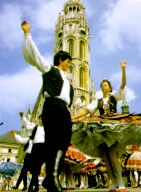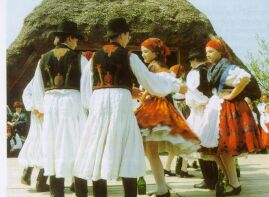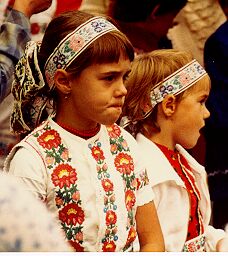Some children learn to dance almost before they learn to walk. These precocious kids can be usually found at any of the many folk dance houses throughout Budapest where string bands provide the rhythm. Hungarian folk dances are done in circles, and in pairs and are danced along with popular Romanian dances from Moldavia and the Balkans. "We play slow csardas,
jumping csardas- the simple tunes from west of
the Danube are used especially for their
Hungarian specific," said fiddler Balazs
Vizeli from the Teka Dance House. "It's
easier to learn tunes and words so that the
children get in touch with the roots music,
watches the dancers, Laszla Csatai dance teacher said, "I have
taught folk dances for 15 years. I've noticed
that for children it is important to have a good
atmosphere, so that they should enjoy themselves
here, and learn to like each There are children who learn to walk here, for they come with their elder siblings and they creep or crawl in circles, and everybody is avoiding them, no problem. The child listens to the music, watches the dancers,and he learns. Some sit stone still for months in their mothers lap, and then one evening we see them how they get up and start to dance perfectly with the others all night.
|
Even if it seems that they don't notice what happens around them, they learn by their mere presence. No matter what their ages, they get along so well. Groups of foreigners come often. It is not difficult if they pay attention to the dance teacher. "What I can tell foreigners is that they can plug into the dance. We've had people here from Finns and Americans, British and Germans. Even black kids danced with us. They love to be with us. All can get into the circle, for the dance is an international language." Helle Sleiborg from Denmark agrees: "We have a group of 16 pupils. My kids are shy, they don't know how to dance, but there is a good atmosphere here." Kim, her husband addds: "This is great! The atmosphere is beautiful. My kids used to go to dances at home, but music, watches the dancers, here they have live music, and this is so good. No tapes."
The parents say that it usually takes 30 minutes to dress their children, but when they say they are going to a dancing house, the kids are ready in five minutes . They prepare days before, they look forward to the dances. "It has a very good effect on children. It makes them music, watches the dancers, bold, they get over inhibitions. They have to take strangers in hand. they dance and find partners easily, they are very receptive. They learn a lot of new steps. They make lots of music, watches the dancers, friends" says Leder Marian, a mother. "We come here every week. The music is so good. My daughter Boriska, (10 months) enjoys the music, she has been coming here since the age of 4 months. My son Marci (two and half) dances if he's in a good mood. music, watches the dancers. The dancing is important, but listening to the music is important, too," said their mother Piroska Kiss. Which proves that this is a good thing for the children who come here. The same children show up often. Some go to different places every week and they have friends all over Budapest. Every place has it's own attraction. The Budapest Sun, May 12-16, 1994 |


